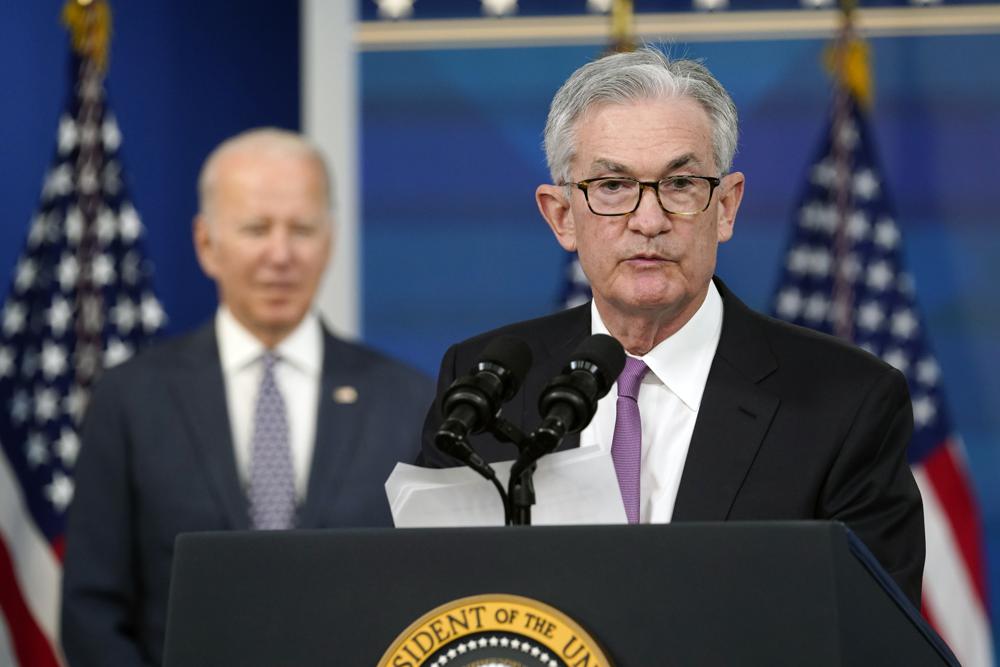
As the Federal Reserve begins to pursue new policies to tame surging inflation, the economic interests of the country and the political future of the Democratic Party both hang in the balance.
Ultimately, President Biden should learn a big lesson from the Federal Reserve’s latest decision. Biden now must recognize that there are politically and economically necessary steps that Democrats also need to take in order to both restrain inflation and help their declining political fortunes—namely, a more restrained approach to spending without tax increases, but with targeted cuts and aid for working people.
The Federal Reserve on Wednesday said that they would accelerate the wind-down of their bond-buying stimulus program, setting the stage to raise interest rates sooner than expected “in light of inflation developments and the further improvements in the labor market.” The Federal Reserve did also signal that they would implement three interest rate hikes in 2022.
After the Federal Reserve’s announcement, the Dow Jones, S&P 500, and the Nasdaq all rebounded, as investors were clearly feeling more confident that the Federal Reserve wouldn’t let inflation continue to soar, but also wouldn’t tighten it too quickly.
Given how out-of-control inflation has become, the Federal Reserve’s stated approach to ending crisis-driven asset purchases and raising interest rates is likely necessary to prevent high inflation from becoming entrenched.
On Tuesday, the Labor Department reported that wholesale prices rose 9.6% from a year ago—the quickest pace on record. Further, inflation in November 2021 accelerated at its fastest pace since November 1982, and was recorded at a 6.8% pace on a year-on-year basis.
Inflation is also outpacing wage growth, meaning that an apparent paycheck increase actually nets out to a decrease. Accordingly, consumer sentiment is at its lowest level in a decade, per the University of Michigan Consumer Sentiment Index.
For months, the Federal Reserve has been walking the fine line between responding to pressure to control inflation while also being careful not to enact policies or raise interest rates in a way that curbs economic growth or invites another recession.
Though the approach announced by the Federal Reserve on Wednesday seems to be the best course of action at this time, the Covid-19 pandemic’s unpredictability and resurgence has created an especially difficult environment for the central bank, putting their goals of lowering inflation and ensuring a strong labor market into even greater conflict.
Regardless, this significant policy change by the Federal Reserve will undoubtedly have a substantive impact on consumer confidence—and in turn, on voters’ perceptions of Biden’s handling of the economy.
Though the Federal Reserve is not a political institution, we can’t ignore the fact that inflation is a very politically powerful trend, given its tangible impact on everyday Americans.
Steep inflation has coincided with several sharp downturns in presidential approval since at least 1960, and there is evidence to suggest that high inflation leads to a deterioration in presidential popularity, per a FiveThirtyEight analysis.
To that end, recent polling confirms several politically inconvenient truths for Democrats: voters are strained by rising prices, they are dissatisfied with the Biden Administration’s handling of inflation, and they trust Republicans more than Democrats to control inflation.
A majority of voters (56%) say that inflation is causing them major or minor financial strain, with nearly 3-in-10 reporting “major” strain, per a recent Wall Street Journal poll. By an 18-point margin, voters believe Republicans (44%) rather than Democrats (26%) can best tame inflation, and more two-thirds (69%) disapprove of how Biden is handling inflation, including 71% of Independents, according to a recent ABC/Ipsos poll.
Biden’s and Democrats’ poor ratings on inflation—a top area of concern among voters—have fueled their low ratings overall. Just under 43% of Americans approve of Biden, while nearly 51% disapprove, per FiveThirtyEight’s average. Republicans also hold historic 10-point lead in the generic congressional vote, according to CNBC polling.
Because the Federal Reserve is primarily responsible for controlling inflation, this has been an especially thorny political problem for the president and his party. On top of that, inflation is a global issue that has been driven in large part by external factors—i.e., pandemic-related supply chain issues and the Covid-19 stimulus packages, two of which were passed under the Trump Administration.
That being said, Biden does have agency in turning Democrats’ situation around and redefining Americans’ perceptions of his handling of the economy.
Related Articles
State’s leaders must take the crime wave seriously
The high cost of chasing made-up targets
COVID taught parents to value school choice
Bandsplaining my way through the podcast pandemic
California shouldn’t follow Texas’ flawed lead on thwarting constitutional rights
As we enter a new year, the president needs to rally the Democratic caucus around a more restrained approach to spending that does not involve tax increases, though does include precise and targeted cuts and aid for working people.
To that end, Biden should urge Democrats in Congress to shelve the Build Back Better plan for now until inflation begins to wane. While some in his party may be dismayed at the idea, this is the right move until inflation has lessened and confidence in the economy has rebounded.
Ultimately, an effective Democratic approach to spending can play an important role in redefining voters’ perceptions of the economy. That being said, the success, or lack thereof, of the Federal Reserve’s latest policy changes will be truly determinative not only for Biden’s re-election prospects, but even more importantly, for the country’s economic recovery.
Douglas Schoen is a longtime Democratic political consultant.
